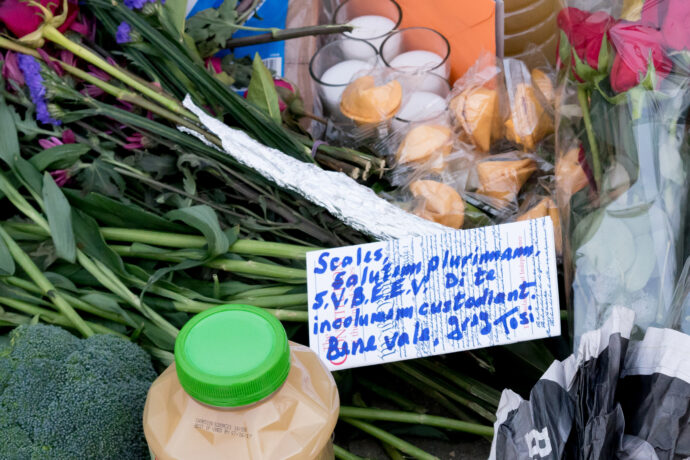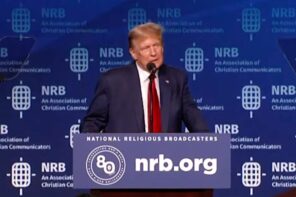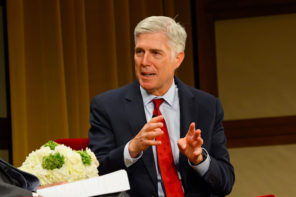The late Antonin Scalia is rightly being remembered for almost single-handedly creating and promulgating the idea of “originalism,” the highly controversial doctrine that the Constitution is like a bug entombed in amber, forever frozen in its original meaning to the people of the day.
For many, his towering contribution in this arena not only overshadows his devout Catholicism, but overrides it. As Emma Green writes in The Atlantic:
His Roman Catholic faith often seemed to lurk in the background of his opinions, especially in cases involving abortion and homosexuality. But above all, he was committed to a literal, originalist interpretation of the Constitution, along with strict attention to the texts of federal and state laws. His views didn’t always align with those of the Church, and he didn’t always side with people making religious-freedom claims.
But less recognized is how Scalia presaged a new kind of Catholicism that in turn profoundly influenced his jurisprudence.
That Scalia was a devout Catholic is clear. He was a product of a Jesuit high school and university. He (along with fellow Court conservative Clarence Thomas) attended St. Catherine of Siena in the tony suburbs of Virginia, with its high Latin Mass and rumblings of Opus Dei. The only child of an Italian immigrant father and a second-generation Italian mother, he and his wife had nine children after playing what he himself called “Vatican Roulette.”
But his rulings fit less neatly into the template of Catholic teaching, than into American conservatism—he agreed with the church on abortion and same-sex marriage but disagreed with it on the death penalty and gun control.
In fairness, Scalia vehemently rejected the suggestion that he was a “Catholic justice.” He famously gave a reporter who asked him about attending the Red Mass the Sicilian salute. He threatened to boycott the University of Chicago after a law professor there noted that all five justices who upheld the prohibition of “partial-birth” abortion were Catholic, suggesting it may have influenced the outcome.
His abhorrence of these suggestions was a rejection of the old-school notion, still very much in evidence when he came of age in the 1950s and 1960s, that Catholics were beholden to the Vatican for their public and private morality. And Scalia clearly was not.
But he was at the forefront of a new kind of morality—one that merged conservative Catholic social teaching with the pro-business, small government mentality of the late twentieth century Republican Party. And it was here that Scalia’s “originalism” was most useful, because it allowed him to assert that there were no new rights under the Constitution, which conveniently left intact the status quo regarding sexual morality and minority rights, while championing the long-standing “legitimate” rights under the Constitution of business and gun owners.
In 2004, Scalia complained that the Court had “now determined that liberties exist under the federal Constitution—the right to abortion, the right to homosexual sodomy—which were so little rooted in the traditions of the American people that they were criminal for 200 years.”
The fact that these things were “criminal” because the Constitution was written by (presumably) straight men who controlled politics, society and business didn’t matter.
Scalia’s views regarding abortion were frequently described as “nuanced” or “complex” because while he opposed it he asserted that it was up to the states to determine its legality. But it’s worth noting that it was the Catholic Church’s political power that prevented all but one-quarter of the states to keep abortion illegal prior to Roe v. Wade. The “states’-rights” position, which happened to be the position of the Catholic Church’s National Committee on a Human Life Amendment, was seen as the most politically feasible way to roll back Roe.
Scalia was less nuanced about homosexuality. In the 2003 Lawrence v. Texas decision that struck down criminal sodomy and paved the way for legalization of same-sex marriage, he complained that the opinion was “the product of a law-profession culture, that has largely signed on to the so-called homosexual agenda, by which I mean the agenda promoted by some homosexual activists directed at eliminating the moral opprobrium that has traditionally attached to homosexual conduct.”
Despite his evident distaste for the social acceptance of homosexuality, he claimed that he was only sticking to his belief in originalism. “Don’t paint me as anti-gay or anti-abortion or anything else. All I’m doing on the Supreme Court is opining about who should decide,” he said in 2015.
But this self-justification often didn’t hold up in reality, especially on the issues that he really cared about: those who reinforced conservative Catholic sexual morality. As John Allen notes in Crux, he had occasion in 2012 to talk to Scalia about the contraceptive mandate in the Affordable Care Act. Scalia told him that if the Catholic bishops wanted an exemption, “they should try to get it through the democratic process.” But then he turned around and voted in the Hobby Lobby case for a much more consequential and precedent-shattering exemption for for-profit business owners rather than insist that they go through the “democratic process.”
The decision not only contradicted what he told Allen, but his own logic in the foundational religious freedom case Employment Division v. Smith that religious exemptions shouldn’t be provided to reasonable, generally applicable laws because they would make a hodge-podge out of the law. Except when they should. It’s worth noting that Smith dealt with an exemption for drug use for a minority religion, while Hobby Lobby for the right of male, Christian corporate owners to deny contraception to women.
It’s a perfect example of what Scalia biographer and constitutional scholar Bruce Allen Murphy called the justice’s “pro-religious accommodation, pro-corporation constitutional rights, view point.” It may not have been a very “Catholic” decision, but it was the kind of conservative Catholic originalist decision that has come to define the political right.
In fact, the pattern of Scalia’s “faint-hearted” originalism is so clear that you can’t help but get the feeling that he arrived at it by reverse logic to protect what he valued—conservative social mores and male corporate homogeny—and to denigrate what he didn’t: the personal sexual autonomy of women and gay people.





